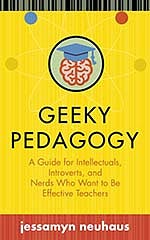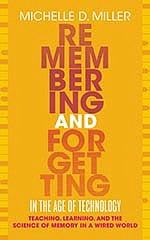The Science Teaching Journal Club is a partnership of the Science Literacy Program and the Teaching Engagement Program. Each week we read, discuss, and consider how to implement ideas from an article or book that explores issues relevant to teaching and learning in college science classrooms. We invite participants from all ranks and disciplines to join us for these sessions, which we use to model evidence-based teaching practices.
Thursdays at 9 a.m.
In person: LISB 217 OR
Zoom: https://uoregon.zoom.us/j/369256082
Questions? Please contact Julie Mueller (jmueller@uoregon.edu)
Winter 2023 Journal Club Readings


This term we will read portions of two recent teaching-related books. The first is Remembering and Forgetting In the Age of Technology: Teaching, Learning, and the Science of Memory in a Wired World, by Michelle D. Miller. It presents a non-technical overview of how memory and attention work, ways to enhance them, and how to use (and not use) technology to support effective learning and functioning by supplementing memory rather than replacing it. The second book is Geeky Pedagogy: A Guide for Intellectuals, Introverts, and Nerds Who Want to be Effective Teachers, by Jessamyn Neuhaus. Don't be put off by the title! This book identifies important areas every instructor should attend to, while acknowledging how the instructor's identity and employment status affect the pedagogical choices they are able to make as well as how students perceive them.
These books are of interest across disciplines, so we welcome participants from across the University. The more voices we have in the room (or on Zoom!), the richer our conversations, so please join us!
Miller, M. (2022). Remembering and forgetting in the age of technology: Teaching, learning, and the science of memory in a wired world. Morgantown: West Virginia University Press.
- Summary and other information
- Listen to a Tea for Teaching podcast episode featuring Michelle Miller talking about Remembering and Forgetting in the Age of Technology.
- Browse the UO Library's electronic copy of Remembering and Forgetting in the Age of Technology
Neuhaus, J. (2019). Geeky pedagogy: A guide for intellectuals, introverts, and nerds who want to be effective teachers. Morgantown: West Virginia University Press.
- Summary and other information
- Listen to a Tea for Teaching podcast episode featuring Jessamyn Neuhaus talking about Geeky Pedagogy.
- Browse the UO Library's electronic copy of Geeky Pedagogy
Weekly readings will also be available through Perusall. Please contact Julie Mueller if you have trouble accessing the books.
Tentative Schedule:
| Week | Reading |
|---|---|
| Week One (1/12) | Remembering and Forgetting, Introduction: Machines, Memory, and Learning (pp. 1 - 17) Remembering and Forgetting, Chapter 1: What Technology Does to Us (and for Us): Taking a Critical Look at Common Narratives (pp. 19 - 44) |
| Week Two (1/19) | Remembering and Forgetting, Chapter 2: Why We Remember, Why We Forget (pp. 45 - 85) |
| Week Three (1/26) | Remembering and Forgetting, Chapter 3: Enhancing Memory and Why It Matters (pp. 87 - 131) |
| Week Four (2/2) | Remembering and Forgetting, Chapter 4: Memory Requires Attention (pp. 133 - 169) |
| Week Five (2/9) | Remembering and Forgetting, Chapter 5: The Devices We Can't Put Down: Smartphones, Laptops, Memory, and Learning (pp. 171 - 210) Remembering and Forgetting, Conclusion: How Memory Can Thrive in a Technology-Saturated Future (pp. 211 - 226) |
| Week Six (2/16) | Geeky Pedagogy, Introduction: "Strange, Specific Stuff" (pp. 1 - 19) |
| Week Seven (2/23) | Geeky Pedagogy, Chapter 1: Awareness (pp. 21 - 47) |
| Week Eight (3/2) | Geeky Pedagogy, Chapter 2: Preparation (pp. 48 - 89) |
| Week Nine (3/9) | Geeky Pedagogy, Chapter 5: Practice (pp. 144 - 160) Note that we have skipped Chapter 3: Reflection and Chapter 4: Support, as they are related to topics discussed in Fall 2022. |
| Week Ten (3/16) | Picture a Professor: Interrupting Biases about Faculty and Increasing Student Learning Chapter 7: Reflect to Deflect: Using Metacognitive Activities to Address Student Perceptions of Instructor Competence and Caring |
- Read and collaboratively annotate articles with Perusall
There are two ways to access Perusall
- Through Canvas (as an instructor, ideally in an inactive course or a sandbox site)
- In a UO Canvas site, click on Perusall in the blue menu at the left of the page. If you are the instructor of the Canvas course, you might need to put Perusall into the blue menu first, by going into Settings > Navigation, then choosing Enable in the 3-dot menu next to Perusall.
- Alternatively, create a "test," unpublished assignment in Canvas. In the Submission Type field, choose External Source, then search for Perusall in the "Enter or Find an External Tool URL" box. Check the "Load This Tool in a New Tab" box. Save, then click the "Load in a New Window" button that appears.
- Once in Perusall, select "Enroll in Course" and enter the course code MUELLER-XT3WP.
- Choose Science Teaching Journal Club in the MyCourses list.
- Select the Assignments tab at the top of the page.
- Directly through a browser
- Navigate to http://app.perusall.com
- Follow the instructions to create an account. Do not try to use your UO email address.
- Click Create or Enroll in a Course
- Select "I am a Student"
- Enter the course code MUELLER-XT3WP.
- Choose Science Teaching Journal Club in the MyCourses list.
- Select the Assignments tab at the top of the page.
Contact Julie (jmueller@uoregon.edu) if you have trouble!
- Through Canvas (as an instructor, ideally in an inactive course or a sandbox site)
